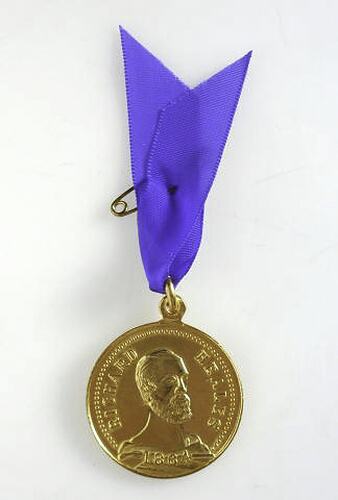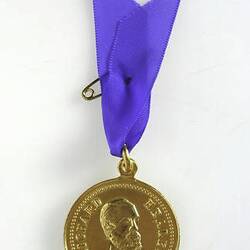Richard Heales was born in London and served an apprenticeship as a coach builder in London. At the age of 19 he married Rhoda Parker, and they soon set sail for Victoria, arriving in February 1842 as bounty immigrants. Initially he only found work as a day labourer, but within five years was a coach builder in Collins Lane. He later opened a business in Lonsdale Street.
Heales was a firm believer in temperance and soon became it most energetic leader in Victoria. One year after arriving in Victoria he was secretary of the newly-formed Total Abstinence Society and his father, who had also migrated, became its president. By 1850 Heales was widely known as a temperance speaker. He entered the Melbourne City Council and defeated John O'Shanassy in Gipps ward in November 1850. He developed a reputation as a democrat and social reformer because of his anti-temperance work, support for the secret ballot, anti-transportation sentiments and support of early closing of public houses.
In 1852 Heales formed a partnership with Edmund Ashley, a fellow immigrant and abstainer. They went to England for three years and returned to Melbourne in 1857 to establish Ashley & Heales, importers and suppliers of coach making materials, in Therry St, Melbourne. They were also involved in the blackwood harvesting industry in the Dandenongs. In Melbourne Heales resurrected the Total Abstinence Society and established the Temperance League, believing that the gold rush was threatening the temperance movement. He was president of both groups until 1864.
In 1856, on a platform of education reform and land for agriculturalists, Heales resumed his political career. He was not elected, but in 1857 won the East Bourke borough and represented it until 1864. He supported justice for all, and did not favour a particular class. In August 1860 Heales came into political prominence when he and C.G. Duffy moved that the assembly support only a government pledged to pursue the land bill over which an earlier ministry had resigned. The motion was lost, but Heales was asked to form a government. Unable to gather sufficient support, he became chief secretary in a ministry brought together by J.H. Brooke. In June 1861, after achieving important reforms in the civil service but little else, he was defeated in a no-confidence motion. The ministry lasted only until November, and Heales' proposed land reform, protection to industry and a general system of education were unsuccessful in the face of opposition.
Heales subsequently managed to force a government bill past the unwilling O'Shanassy government to establish a single board of education. In 1863 Heales became minister for lands; he had opposed the 1862 Land Act as likely to favour squatters and brought in two bills to amend it. However the bills were allowed to lapse, and in April 1864 Heales was granted sick leave from parliament. He died from tuberculosis, aggravated by overwork at the age of 42. He was survived by his wife, six sons and two daughters, and parliament voted 3,000 pounds for their support. The Age considered his death a public calamity, and crowds lined the streets to watch his funeral procession. The Victorian parliament later named Healsville after him.
References:
Australian Dictionary of Biography.
More Information
-
Keywords
-
Localities
-
Authors
-
Article types

